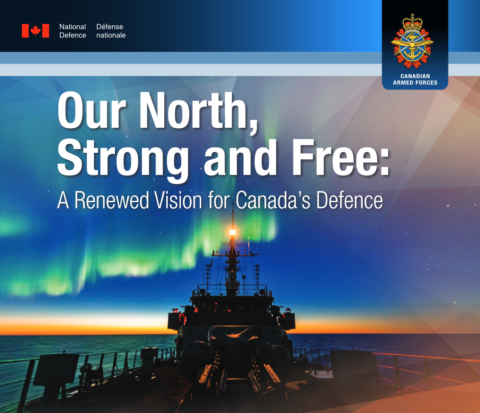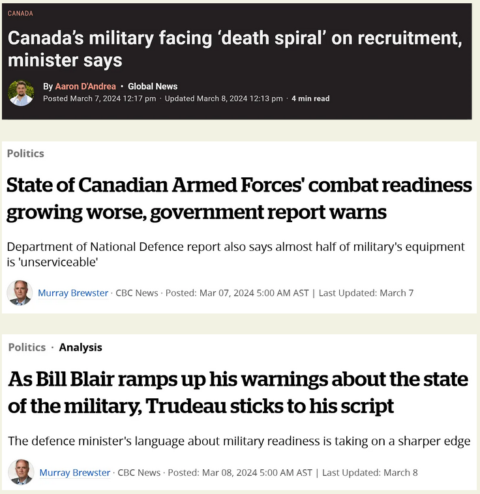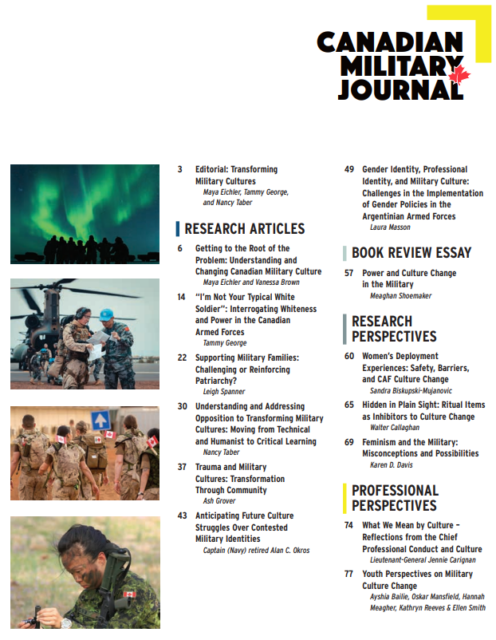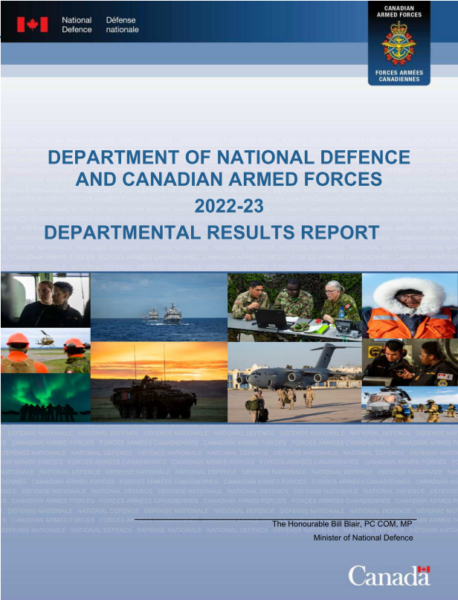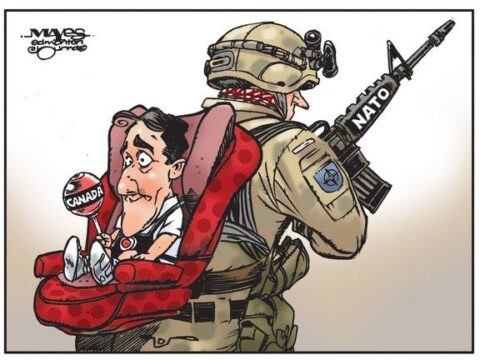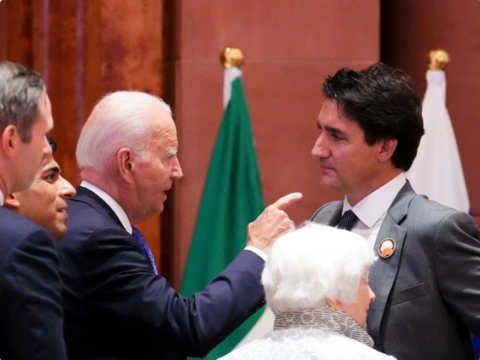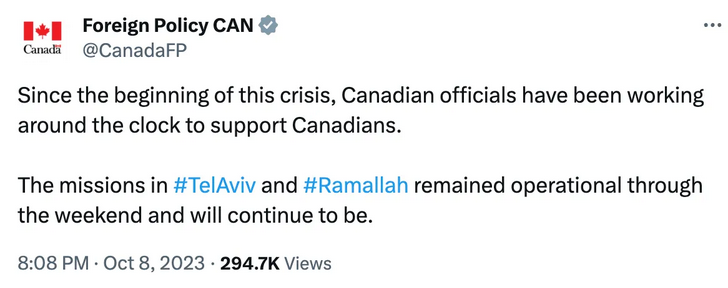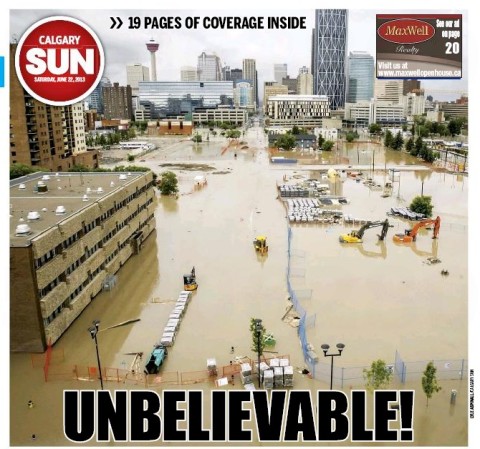Esprit de Corps Canadian Military Magazine
Published Apr 22, 2024The Liberal government have finally released their long awaited Defence Policy Update which promises billions of dollars in increased spending for the CAF. Critics wonder if such promises are worth the paper they are printed on. History says that when it comes to military budgets, promises are made to be broken. Good Grief.
(more…)
April 23, 2024
KICKING IT TO THE MOON? Canada’s Military Procurement: A history of broken promises
April 21, 2024
Canada’s latest unlikely-to-meet-expectations defence update
In The Line, Michael Den Tandt considers the Trudeau government’s most recent update to Canada’s defence plans (where the cynic might be tempted to read “plans” as “vague gestures toward treaty obligations with no real intent to do more”):
… Among the more intriguing findings is that no likely economic path has China overtaking the United States in terms of global influence, between now and 2040. And all likely paths project a sharp decline in global population growth over the same period, including in China.
This is worrying, because declining population growth is a precursor to declining economic power, which in turn means declining military might, and also a tendency to lash out. As the American political scientist Michael Beckley has noted, there is a lengthy historical pattern of rising powers becoming expansionist when their initial economic boom slows. In a prolonged multipolar interregnum between the U.S.-led order that followed the Second World War, and whatever comes next, threats will continue to multiply. A capable military is essential to national survival.
Which brings us back to the federal defence update, and its raft of new spending, with $8.1 billion in additional funding by 2029-30, by which time Canada’s military spending will reach just under 1.8 per cent of GDP, with steady increases adding up to $72.3-billion by 2043-44. Commitments include ramping up recruitment, revamping procurement, new subs for the Arctic, tactical helicopters, new vehicles and long-range missiles, drones, a new Canadian Cyber Command, and more. There is a laudable commitment to developing reserves of ammunition.
The commitment — as was a prior promise, from 2022, to spend $38 billion on NORAD modernization over 20 years — is all to the good.
But the elephant in the room, when it comes to federal defence commitments, is that we’ve seen these before, from both major governing parties, with disappointing results. The purchase of new fighters for the Royal Canadian Air Force was first announced in July of 2010. The rebuild of the Royal Canadian Navy’s surface combatants, replacements for the 1980s-era frigates, was first announced in the fall of 2011. We don’t yet have either new fighter jets or new surface combatants. And the vast majority of funding outlined in the updated policy statement will be up to future governments. Net incremental new spending in 2024-25 is just $612 million.
There was a historical moment, not long ago, when Canadian military preparedness advanced at a wartime pace — when Canadian soldiers were fighting and dying in Afghanistan. From 2005 through 2010, the governments of Canada, initially Liberal, then Conservative, set about getting our soldiers the kit and equipment they needed. In short order the CAF acquired Chinook helicopters, Boeing C-17s and Hercules C-130 transports, and more. It is possible.
The great risk in building up Canada’s defences at a leisurely, peacetime rate, is that the days of leisurely, peacetime stability are over. The update can be counted as progress. But it needs a major infusion of urgency.
April 18, 2024
On The Line with General Wayne Eyre, commander of the Canadian Armed Forces
The Line
Published Apr 16, 2024General Wayne Eyre served for decades in the Canadian Army, including as its commander, before being promoted to Chief of the Defence Staff in 2021. During his time as Canada’s top soldier, he has overseen not only a series of challenges inside the Canadian military, but also a rapid deterioration in the geopolitical environment. The world is a more dangerous place, and Gen. Eyre has been unusually outspoken in noting that Canada needs to do more to be ready for what’s coming.
In this conversation with The Line‘s Matt Gurney, the general provides his take on the state of the world today, shares his thoughts on the recently announced Defence Policy Update, and talks about why he is encouraged by some of what he is already seeing change with Canada’s military readiness.
On The Line is The Line‘s newest podcast, featuring longer interviews by either Jen or Matt with someone who is currently in the news or able to speak to something topical (or, sometimes, simply fun and interesting). We are still getting it up to speed, but Line listeners and viewers can expect an episode weekly by next month, at the latest.
To never miss an episode of either On The Line or The Line Podcast, sign up today to follow us on YouTube, on the streaming app of your choice and, of course, at ReadtheLine.ca, home of The Line. Like and subscribe!
Please note: This interview was recorded on Friday, before the Iranian attack on Israel.
April 11, 2024
All the ways A few of the ways Canada is broken
In The Line, Andrew Potter outlines some of the major political and economic pressures that prompted the formation of the Dominion of Canada in 1867, then gets into all the ways some of the myriad ways that Canada is failing badly:
It is useful to remember all this, if only to appreciate the extent to which Canada has drifted from its founding ambitions. Today, there are significant interprovincial barriers to trade in goods and services, which add an estimated average of seven per cent to the cost of goods. Not only does Canada not have a free internal market in any meaningful sense, but the problem is getting worse, not better. This is in part thanks to the Supreme Court of Canada which continues its habit of giving preposterously narrow interpretations to the clear and unambiguous language in the constitution regarding trade so as to favour the provinces and their protectionist instincts.
On the defence and security front, what is there to say that hasn’t been said a thousand times before. From the state of the military to our commitments to NATO to the defence and protection of our coasts and the Arctic to shouldering our burden in the defence of North America, our response has been to shrug and assume that it doesn’t matter, that there’s no threat, or if there is, that someone else will take care of it for us. We live in a fireproof house, far from the flames, fa la la la la. Monday’s announcement was interesting, but even if fully enacted — a huge if — we will still be a long way from a military that can meet both domestic and international obligations, and still a long way from the two per cent target.
As for politics, only the most delusional observer would pretend that this is even remotely a properly functioning federation. Quebec has for many purposes effectively seceded, and Alberta has been patiently taking notes. Saskatchewan is openly defying the law in refusing to pay the federal carbon tax. Parliament is a dysfunctional and largely pointless clown show. No one is happy, and the federal government is in some quarters bordering on illegitimacy.
All of this is going on while the conditions that motivated Confederation in the first place are reasserting themselves. Global free trade is starting to go in reverse, as states shrink back from the openness that marked the great period of liberalization from the early 1990s to the mid 2010s. The international order is becoming less stable and more dangerous, as the norms and institutions that dominated the post-war order in the second half of the 20th century collapse into obsolescence. And it is no longer clear that we will be able to rely upon the old failsafe, the goodwill and indulgence of the United States. Donald Trump has made it clear he doesn’t have much time for Canada’s pieties on either trade or defence, and he’s going to be gunning for us when he is returned to the presidency later this year.
Ottawa’s response to all of this has been to largely pretend it isn’t happening. Instead, it insists on trying to impose itself on areas of provincial jurisdiction, resulting in a number of ineffective programs — dentistry, pharmacare, daycare, and now, apparently, school lunches — that are anything but national, and which will do little more than annoy the provinces while creating more bureaucracy. Meanwhile, the real problems in areas of clear federal jurisdiction just keep piling up, but the money’s all been spent, so, shrug emoji.
What to do? We could just keep going along like this, and follow the slow-mo train wreck that is Canada to its inevitable end. That is is the most likely scenario.
March 28, 2024
Justin Trudeau never misses an opportunity to make a performative announcement, even if it harms Canadian interests
Canadian Prime Minister Justin Trudeau made an announcement last week that the Canadian government was cutting off military exports to Israel … except that Canada buys more military equipment from Israel than vice-versa:
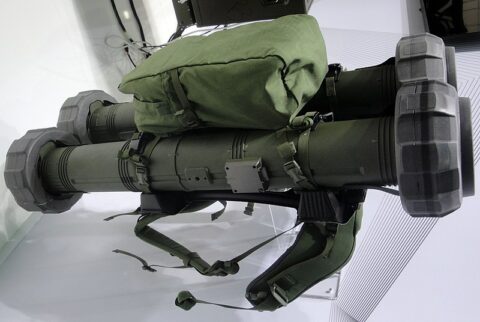
Israeli Spike LR2 antitank missile launchers, similar to the ones delivered to the Canadian Army detachment in Latvia in February.
Wikimedia Commons.
When the Trudeau government publicly cut off military exports to Israel last week, the immediate reaction of the Israeli media was to point out that Canada’s military was far more dependent on Israeli tech than was ever the case in reverse.
“For some reason, (Foreign Minister Melanie Joly) forgot that in the last decade, the Canadian Defense Ministry purchased Israeli weapon systems worth more than a billion dollars,” read an analysis by the Jerusalem Post, which noted that Israeli military technology is “protecting Canadian pilots, fighters, and naval combatants around the world.”
According to Canada’s own records, meanwhile, the Israel Defense Forces were only ever purchasing a fraction of that amount from Canadian military manufacturers.
In 2022 — the last year for which data is publicly available — Canada exported $21,329,783.93 in “military goods” to Israel.
This didn’t even place Israel among the top 10 buyers of Canadian military goods for that year. Saudi Arabia, notably, ranked as 2022’s biggest non-U.S. buyer of Canadian military goods at $1.15 billion — more than 50 times the Israeli figure.
What’s more — despite Joly adopting activist claims that Canada was selling “arms” to Israel — the Canadian exports were almost entirely non-lethal.
“Global Affairs Canada can confirm that Canada has not received any requests, and therefore not issued any permits, for full weapon systems for major conventional arms or light weapons to Israel for over 30 years,” Global Affairs said in a February statement to the Qatari-owned news outlet Al Jazeera.
The department added, “the permits which have been granted since October 7, 2023, are for the export of non-lethal equipment.”
Even Project Ploughshares — an Ontario non-profit that has been among the loudest advocates for Canada to shut off Israeli exports — acknowledged in a December report that recent Canadian exports mostly consisted of parts for the F-35 fighter jet.
“According to industry representatives and Canadian officials, all F-35s produced include Canadian-made parts and components,” wrote the group.
March 12, 2024
The recently admitted “death spiral” for the Canadian Armed Forces is nothing new
“Shady Maples” outlines just a few of the historical procurement fuckups Canada’s armed forces have had to work through, showing that the recent admission that the armed forces are in a “death spiral” by MND Bill Blair is almost “situation normal” for the troops:
The Canadian Armed Forces are fucked. By this term of art, I mean that the CAF:
- are in dire circumstances; and
- are being used for such aggressive political gratification that it’s practically perverse.
You don’t have to take my word for it. The Minister of National Defence made the following remarks last week:
because, the bottom line is the Canadian Armed Forces must grow. We’re short a lot of people. Almost 16,000 in our regular forces and reserves.
If that wasn’t bad enough, he added:
more than half of our trucks, more than half of our ships and more than half of our planes are not available for service because they are in need of parts and repair. We’re going to have to do better.
Translation: we are fucked.
The MND’s remarks come eleven months after the CDAI published an open letter on the state of national security and defence:
Years of restraint, cost cutting, downsizing and deferred investments, have meant that Canada’s defence capabilities have atrophied. Our military capabilities are outdated and woefully inadequate to protect our landmass and maritime approaches. We have also fallen short in meaningful contributions to burden sharing for the collective defence and security of our allies and partners.
Translation: we have been fucked for awhile.
More recently, the Vice Admiral Tophsee made waves on the RCN’s official YouTube channel by stating the obvious:
Colleagues and Shipmates, the RCN is facing some very serious challenges right now that could mean we fail to meet our Force Posture and Readiness commitments in 2024 and beyond. La situation est grave mais nos problèmes ne sont pas uniques et je sais que l’aviation et l’armée sont confrontées a des défis similaires. [The situation is serious, but our problems are not unique, and I know that the Air Force and the Army are facing similar problems.]
Translation: we will be fucked for the foreseeable future.
He then shows that this sort of thing has been part-and-parcel of Canada’s delusionary approach to national defence since the year before Confederation. Canada’s WW1 army was sent off with fantastically bad equipment — from rifles to web gear, from automobiles to artillery ammunition — all scandals of the day that no lessons were learned from.
Soldiers and officers at the tactical level will readily tell you that these headlines are only surprising because senior leaders are finally saying the quiet part out loud: the CAF is undermanned, under-equipped, under-trained, and unprepared. We know this because we live it every day: situation normal, all fucked up. But you don’t need a source or a leak to learn about our deplorable state of readiness. Here is a link to DND’s 2023 audit and evaluation reports. They paint a bleak picture: we have insufficient equipment and what we have keeps breaking. We have insufficient personnel to match with commitments, and we are struggling to recruit, train, and retain more. Go have a look at the reports, they lay it all out.
March 7, 2024
Canadian Armed Forces belatedly starts to worry that their pandemic fake news propaganda stunt might, somehow, undermine public confidence
When I first heard about this, despite all the evidence we’d seen during the Wuhan Coronavirus years of governments going out of their way to mislead and deceive the voters, I thought it was fake news. But according to David Pugliese’s report in the Ottawa Citizen, they really did do and and only now are starting to worry that they should not have done that:
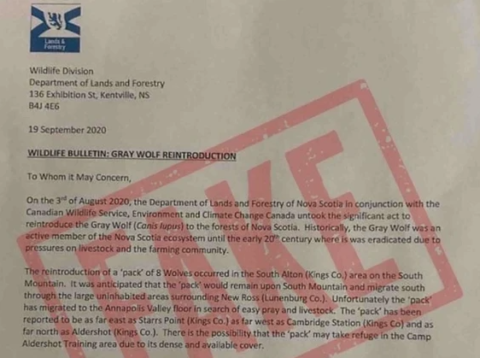
A screenshot of the fake letter from the Nova Scotia government which was sent out to residents to warn about a pack of wolves on the loose in the province. The letter was actually a forgery by Canadian military personnel as part of a propaganda training mission.
Photo by NS Lands Forestry Twitter/X /Handout
The Canadian Forces worried the public would link its previous efforts to test propaganda techniques during the pandemic to a bungled exercise in which the military spread disinformation about rampaging wolves, according to newly released records.
Military officers worried the 2020 wolves training fiasco, combined with previous coverage in this newspaper about their efforts during the COVID outbreak to test new methods to manipulate Canadians, could have “the effect of undermining our credibility and public trust”.
The October 2020 exercise involving fake letters about wolves on the loose, which caused panic in one community in Nova Scotia, was a propaganda test gone awry, generating embarrassing news coverage across Canada and in some U.S. media outlets.
Just as that incident was being reported by media outlets, a non-government group called the Organized Crime and Corruption Reporting Project released details about the Canadian Forces spending more than $1 million on training on how to modify public behaviour. That training had been used by the parent firm of Cambridge Analytica, the company that was at the centre of a scandal in which personal data of Facebook users was provided to U.S. President Donald Trump’s political campaign.
In addition, this newspaper had reported months earlier, the Canadian Forces had tested new propaganda techniques during the pandemic and had concocted a plan to influence the public’s behaviour during coronavirus outbreak.
The various reporting set off alarm bells inside the military’s public affairs branch at National Defence headquarters in Ottawa, according to documents released under the access to information law.
Col. Stephanie Godin wrote Brig.-Gen. Jay Janzen on Oct. 16, 2020 warning that since the story about the fake wolf letters broke “there has been a resurgence of media and public criticism regarding perceived nefarious IO/IA (propaganda) against the Canadian public”.
She also noted how then-army commander Lt.-Gen. Wayne Eyre contacted Laurie-Anne Kempton, then the assistant deputy minister for public affairs at National Defence. Eyre wanted to “discuss how the wolf letter issue could be removed from being conflated with” the $1 million training course on influence techniques as well as the previous articles on military pandemic propaganda plans, Godin wrote.
I mean, did they hire George Monbiot as a consultant for this idiocy?
January 11, 2024
The Canadian Armed Forces believe “that they – and the country they serve – are irredeemably racist and oppressive”
The official journal of the Canadian Armed Forces has a … woke … view of themselves and the nation:
… the latest edition — which was just posted online — contains little to no mention of strategy, geopolitics or the avalanche of contemporary problems facing the Canadian Armed Forces. There’s not a single reference to the recruiting crisis, which has left vacancies of up to 40 per cent in some departments. No mention of the plummeting maintenance standards that recently prompted the commander of the Royal Canadian Navy to declare that his fleet was in a “storm” with no end in sight. No discussion of why Canada is slashing its military budget even as its peer countries do the exact opposite.
Instead — in a signal of just how far the Canadian Armed Forces has embraced far-left “anti-racist” ideology — the entire issue is devoted to how the Canadian military is a racist, patriarchal den of colonialist oppression that needs to be torn down and remade from scratch.
After devoting extended paragraphs to each cultural infraction, Eichler concludes that the Canadian Armed Forces must be remade via an “anti-oppression framework” of “feminist, decolonial, critical race, queer, critical disability, and critical political economy theories”.
Eichler notes this is “not an easy task, but a necessary one if DND/CAF wants to move the yardstick on culture change.”
Another feature, by York University psychotherapist Tammy George, frames the Canadian Armed Forces as being poisoned by “institutional whiteness”.
“In order for meaningful, sustained culture change to occur, there must be a recognition by the white majority of the way in which whiteness organizes lives,” she writes.
Leigh Spanner, a feminist postdoctoral research fellow, wrote that the CAF’s system of supporting military families was anti-feminist and patriarchal.
Ash Grover, a researcher in “feminist anti-militarism”, argues that the military might have fewer instances of post-traumatic stress disorder if they paid closer attention to “anti-oppressive theory” and how “acts of ‘othering’ can result in responses typically associated with post-traumatic stress disorder”.
December 26, 2023
Canada is the unchallenged international champion of “the gesture” and “the pose”, yet always manages to be out of the room when the bill needs to be paid
Sorry for being several days behind on this, but Matt Gurney‘s message — while necessary and timely — does not have a “best-before” or an expiration date … it’s going to be valid for a long time to come:
On the military front, Canada has actually made some meaningful investments since that speech was given. We have announced deals for new transport and refuelling jets — desperately needed and long overdue. We more recently announced a plan to sole-source new surveillance planes, also desperately needed and long overdue. We also, just this week, announced that we are procuring a fleet of large, long-ranged, armed surveillance drones, to patrol our remote air and sea frontiers, after a mere two decades of mulling it over.
There ends the good news, sadly. Most of these procurements are many years away from actually being in service. And even once we have them, as good as the new equipment will be, the biggest problem for the military today is a crippling personnel shortage. The military is, to be blunt, a disaster. Far worse than is generally known. I’ve been covering military and defence issues for longer than I care to recount, and I can tell you plainly, dear readers, that the level of panicked leaking and lamenting coming out of the Canadian Armed Forces is like nothing I’ve ever seen. We don’t have the troops, sailors and aircrew to meet even basic obligations. Training is falling behind. The in-service availability of equipment and vehicles is appallingly low for lack of trained maintenance personnel and money for spare parts and equipment.
This is showing up in operations. The army doesn’t have enough soldiers to meet every commitment. The air force has cut back on operations. The navy’s top admiral is openly speaking, in public, about the crisis in his service.
We at The Line often talk about the Canadian love of talking about inputs instead of outputs. It’s easier to say “Our government has committed X dollars over Y years to address Societal Problem Z” than it is to actually ever have to answer to the public about why Z is somehow still getting worse. New procurements are an input; the desired output is a functional Canadian Armed Forces, capable of meeting its domestic obligations, honouring our treaty commitments and also being prepared for any unexpected contingencies. We do not have that military today. We cannot have that military for years. It would take massive investments and sustained effort to begin fixing this problem.
That is not happening. Hell, we took Anita Anand, one of Justin Trudeau’s better ministers and replaced her with Blair, a man for whom that has never been said. I can tell you with certainty that our allies, and our senior military commanders, had no trouble reading between those lines. Trudeau thought the military mattered, briefly, but then he stopped thinking that, and here we are.
So, 14 months out from Freeland’s speech and on the military front, well … Merry Christmas, or something?
But wait! There’s more!
Freeland’s speech also talked about other ways Canada could support its allies, and democracies in general. Some of it was vague and aspirational — hard to measure or follow-up on. But she was specific about two things: providing our threatened allies and the democracies broadly with a stable, democratic and reliable source of critical strategic resources. Energy, for example. And minerals.
Fourteen months later, how are we doing on those fronts?
I’m not an expert in either area, but I know experts in both. Andrew Leach is an energy and environmental economist at the University of Alberta (I literally copied that bio right off his webpage there). He is also, simply put, one of the smartest guys on the energy file in this country. I called him this week and found him grading papers, which is probably why he was so willing to talk with me. I explained to him what I was doing with the Brookings speech, and asked him if there was anything he could point to over the last 14 months as signs that we’d gotten serious and were doing as Freeland had said we would and must.
Nope!
“By any metric, it’s worse today,” Leach said. Two months ago, he noted, the Supreme Court ruled against the Trudeau government’s energy policies. “Now, there are no clear processes to get approvals for anything,” he added, except, somewhat ironically, pipelines, whose approvals process wasn’t included in the court ruling. I asked him if this was something the Trudeau government had done to itself, or if it was a victim of happenstance, and he said that some of the legislation they were dealing with dated back to the Harper era — before their time — but that in general, the Trudeau government hadn’t handled this well. “They messed up. They assumed they had powers they didn’t have, and didn’t make the arguments for those powers. They didn’t think about the framing. They had to earn that. They didn’t.”
November 23, 2023
Canada’s bold move in an increasingly unsettled world is to … cut the military budget
The rest of Canada’s friends and allies are almost all beefing up their military spending because the world situation has become objectively more dangerous, but Justin Trudeau has never been one to follow the trend, especially when it comes to icky military stuff. Tristin Hopper has the details:
Just as the Liberal government’s fiscal update confirms that they will be staying the course on high spending backed by high deficits, they’re making a notable exception when it comes to the perennially underfunded Canadian Armed Forces.
According to the latest budgetary projections, Canadian military spending is set to fall in absolute terms for at least the rest of Trudeau’s third term – the only G7 country to do so.
For the current fiscal year, Canada is set to spend $26.93 billion on its military. For the 2024/2025 fiscal year, that will drop to $25.73 billion, and then drop again to C$25.33 billion by 2026.
These cuts are all in spite of increasingly desperate calls by the minister of defence and the military’s own internal reports that the Canadian Armed Forces may soon struggle to fulfill even basic tasks. It also stands in sharp contrast to virtually all of Canada’s peer countries, who are roundly beefing up their defence spending in response to an increasingly volatile global environment.
While Bill Blair’s turn as Defence Minister has mostly involved shepherding nearly $1 billion in cuts, at the Halifax International Security Forum over the weekend he struck a very different tone of saying that Canada’s “aspirations” required “more resources”.
“We need to spend more on munitions. We need to spend more on military platforms, planes, submarines and ships. We need to spend more on the equipment, the resources and the training that the Canadian Armed Forces needs,” he said in comments published by the CBC.
And Blair’s assessment was comparatively rosy when compared to the Department of National Defence’s annual departmental results report.The 152-page document, which dropped earlier this month, painted a picture of a Canadian military that is hemorrhaging personnel and capability with no end in sight.
Among the highlights is a table indicating the “percentage of operations that are capable of being conducted concurrently”. Last year it was 100 per cent, but right now it’s plunged to a meagre 40 per cent.
“The CAF is currently unable to conduct multiple operations concurrently,” reads a footnote, adding that military readiness has been hit hard by “decreasing number of personnel and issues with equipment and vehicles”.
Recruiting is suffering an “applicant crisis”. There’s a shortage of “qualified aircraft technicians”. The military’s bases are in serious deterioration because they can’t afford “maintenance and repair”. Only about 40 per cent of the RCAF is operational due to “ongoing personnel shortages” and “inadequate maintenance infrastructure”.
It wasn’t too long ago that another defence minister, Anita Anand, was openly musing about raising Canada’s defence budget to the point where it would finally start meeting NATO’s minimum threshold for military spending.
November 1, 2023
Canada’s (deliberate lack of) strategy
In The Line, Vincent Rigby discusses Canada’s notable lack of any kind of strategy to cope with an international situation that seems to be changing (or deteriorating, take your pick) at a rapid pace:
On the foreign policy front, the Canadian government unveiled its long-awaited Indo-Pacific Strategy almost a year ago. It was a welcome development for Canada’s role in a region at the epicentre of global events. But it was remarkably light on security and is now under severe stress given the serious diplomatic falling-out with India. But more importantly, where is Canada’s broader foreign policy? What will we do in other parts of a turbulent world to protect our security and values? How will we balance regional priorities? Canada has not produced a comprehensive foreign policy statement in 18 years.
On the defence front, Canada unveiled a new policy, Strong, Secure and Engaged, in 2017. After the Russian invasion of Ukraine, the government committed in April 2022 to produce an update to that policy in the following months. A year and a half later, Canadians are still waiting. In the meantime, officials have spoken publicly of possible cuts to the defence budget of $900 million a year over four years as part of broader government spending reductions. A severely stretched military may soon be stretched even further.
On the home front, Canada continues to lurch from crisis to crisis — the Freedom Convoy with its populist underpinnings, Chinese interference in federal elections, possible Indian complicity in the murder of a Canadian citizen, and now tension at home over the fighting in the Middle East. More than ever, Canada’s large diaspora communities feature prominently in security and foreign policy discussions. While Canadians await the findings of yet another public inquiry into the China affair, a broader strategy to confront national security threats is nowhere to be seen. Canada has not produced a national security policy in 19 years.
To be fair, the government has not sat idle during recent global developments. For example, it has ramped up its support to Ukraine (notwithstanding a slow start and the recent embarrassment in the House of Commons), taken measures to improve economic security, and established a National Security Council. But these efforts are all too often modest, piecemeal and reactive.
A Canadian senator famously quipped nearly a century ago that Canada was “a fireproof house far from inflammable materials”. It was barely true in the 1920s, and it is even less so today. But Canadians, despite all recent evidence to the contrary, apparently still believe this to be the case. They assume that the threats are not aimed at Canada, and that the U.S. would come to their rescue regardless. On both counts, such assumptions are dangerous, especially if Donald Trump were to return as president. The government, echoing the indifference of most Canadians, chooses to focus on domestic priorities, from increasing affordable housing to improving health care to fighting inflation. All are undeniably important. But as every prime minister declares, the government ultimately has no greater responsibility than the security of its citizens.
Canada needs an integrated, coherent strategy (or strategies), supported by appropriate resources and capabilities, to respond effectively both at home and overseas to this new world order. It will require trade-offs, but the case needs to be made to Canadians that the generation-long, post-Cold War peace dividend is no longer on offer. Our allies get that — so too must Canada. In the absence of such strategy, the security of Canadians will deteriorate further, and relationships with key NATO and Five-Eyes allies, already in peril, will suffer even more. If not careful, Canada may find itself more alone in the world than ever.
October 23, 2023
Icon of Canadian Search and Rescue For 40 years; the story of the CH-113 Labrador
Polyus
Published 3 Sept 2021The Boeing-Vertol CH-113 Labrador was an icon of Canadian search and rescue for 40 years. It served on both the right and left coast and undertook many life saving rescues in its day. Originally ordered as two models, an army transport version and a search and rescue version, they were all converted to a common standard when the army took possession of their Chinook helicopters. As a dedicated search and rescue helicopter it excelled at its role. Its replacement is a long story for another time but involves several facepalm moments thanks to short sighted decision making. As a result it was kept in service longer than anticipated but still did the job well.
0:00 Introduction
0:27 Previous generation of search and rescue
1:18 Acquisition of the CH-46 Sea Knight
4:10 Definitive CH-113 Labrador model
5:53 Replacement and retirement
6:38 Conclusion
(more…)
October 12, 2023
Canada, “a country with short arms and long pockets”
In the National Post, John Ivison recounts Canada’s continuing inability to live up to expectations internationally, especially militarily:
On the eve of Russia’s invasion of Ukraine, Mark Norman, the former vice-chief of defence, made a prediction that sounded overblown at the time.
“I really think the Americans are going to start ignoring us because they don’t think we are credible or reliable. They are not even putting pressure on us anymore,” he said in a January 2022 National Post interview, based on his conversations with contacts in Washington.
It turns out he was absolutely right.
Since then, leaked Pentagon documents have confirmed that sense, indicating that the U.S. believes “widespread defence shortfalls have hindered Canada’s capabilities, while straining partner relationships and alliance contributions”.
Canada left little room for doubt about its diminished capabilities when it took a pass on NATO’s largest-ever air exercise last summer, because its jets and pilots were involved in “modernization activities”. That absence left the impression that this country might not be able to show up in certain circumstances.
Even before the unfolding tragedy in the Middle East, America was letting it be known that it felt overstretched and needed regional allies to share the burden.
When President Joe Biden visited Ottawa in March, he asked Justin Trudeau to lead a mission to Haiti, which had descended into mob rule. Since the Liberals were elected on a peacekeeping ticket in 2015, it was a logical request. However, Trudeau demurred, presumably on the grounds that Canada’s security forces were stretched too thin by operations in Latvia and fighting wildfires at home. The upshot is that Kenya is set to send 1,000 security officers to the beleaguered island nation.
The recent news that Canada now plans to trim its defence budget by nearly $1 billion — a total of $17 billion over 20 years, if savings are recurring — has reinforced the image of a country with short arms and long pockets.
Against that background, it was no surprise that on Monday Biden hosted a call with the leaders of France, Germany, Italy and the U.K. to discuss the crisis in the Middle East — and didn’t include Canada.
A statement by the G7 minus Canada and Japan (which has a negligible Jewish population) was issued saying that the five countries would ensure Israel is able to defend itself.
Over at The Line, Matt Gurney discovered that the federal government was actively trying to hide the fact that Canadians in Israel were not able to access Canadian embassy services by pretending that the word “operational” meant “open and functional”:
On Sunday evening (hours after we published our dispatch), I received a reply from GAC. This was the reply:
Since the beginning of this crisis, Canadian officials have been working around the clock to support Canadians. The missions in Tel Aviv and Ramallah remained operational through the weekend and will continue to be. Our missions will open on Monday October 9th, unless security conditions do not allow for it. We will be assessing the security situation daily, in coordination with our allies.
Okay! That seemed fair. But not having been born yesterday, and being in a profession where people try to spin me all the time, I noticed something immediately. The distinction GAC was drawing between “operational” and “open” stood out to me. I replied at once seeking clarification, and heard nothing back. Not even an acknowledgement.
This word choice mattered. The government publicly used the “operational” messaging. Members of the government repeated it. This was what they were telling the Canadian people: all is well, ignore those nasty media people and members of the opposition. Of course the embassies were “operational”!
See that tweet? The one pasted above? I checked out who was retweeting it. Lots of people did! And that included a bunch of Liberal MPs, a bunch of Canadian diplomats, members of the media, and what I’ll politely refer to as a group of “usual suspects” I recognize from online as being proxies for the Liberal government’s messaging (or at least really devoted True Believer Liberal partisans).
On Monday morning, having heard nothing back about what “operational” meant as opposed to “open”, I asked for a specific clarification in the terminology. What was “operational” vs. “open”? I also asked for specifics on what services were available locally from Canadian diplomatic missions in Israel over the weekend in real time, and how that would change when the embassy “opened” on Monday. I asked about the staffing level at the embassy on the weekend, and how that would compare to a normal workday, and also to a normal weekend.
Rather than answer a simple question, our government would much rather obfuscate and prevaricate as a matter of policy. That, by itself, tells you everything you need to know about both our political leaders and the civil service organizations they control.
September 30, 2023
With the international situation so stable and peaceful, Canada intends to cut military spending by $1 billion or so
I didn’t think Justin Trudeau could possibly come up with another stunt to outrage our allies, but I stand corrected:
Canada’s top general revealed on Thursday that the armed forces is facing nearly $1 billion in cuts by the Liberal government, saying that military leaders are struggling to understand the change as the forces deal with more pressures in an unstable world.
Speaking to MPs Thursday during a meeting of the defence committee, Chief of Defence Staff Wayne Eyre was asked about proposals to cut $15 billion across the government, which the Liberals promised to do in the spring budget.
Eyre said the Defence Department’s piece of that cut will hurt.
“There’s no way that you can take almost $1 billion out of the defence budget and not have an impact, so this is something that we’re wrestling with now,” he told MPs.
Eyre said he had been discussing the cuts with military leaders and they’re struggling to understand the change.
“Our people see the degrading declining security situation around the world and so trying to explain this to them is very difficult,” he said.
Conservative Defence critic MP James Bezan said he hopes the military doesn’t weaken its readiness with these cuts.
“I sure hope we’re not going to hear stories that we can’t afford to put the fuel in the tanks and train guys in armour, we’re not going to put diesel in the ships and not have the Navy go out there and training, we can’t afford to do maintenance on our tanks,” he said. “We have to make sure we continue to move forward in training and operations.”
Deputy Minister of Defence Bill Matthews said the department is looking at ways to ensure the cuts don’t hurt the ability of the military to fight.
Not to be too cynical, but the Canadian Armed Forces are already well below the funding level we promised our allies we’d achieve, and it impacts pretty much everything the CAF needs to do. It’s quite possible that a budget cut of that size will end meaningful participation in NATO land operations in Estonia, Latvia, Poland, and other front-line allied nations.
August 31, 2023
Disaster response plans? I’m sure they’ve established terms of reference for the to-be-appointed blue-ribbon committees to look into that … eventually
In The Line Jen Gerson discovers once again that our federal government is much more interested in making dramatic announcements — usually repeated many, many times — than in actually doing anything. Their response to her inquiry about federal disaster response planning is anything but comforting to worriers among the citizenry:
The clever and devoted readers of The Line will have already surmised that I am a touch neurotic, prone to catastrophize, and gifted with one of those imaginations that is perfectly capable of picturing in vivid detail every worst-case scenario playing out simultaneously.
And so, dear devotee, you will have no trouble picturing my mental state in recent months, in what will come be known as the Summer of Fire. Until next summer, anyway. Until then, it’s always fun to watch two cities burn (or come close to burning) over the course of a single weekend, eh?
Watching the long lines of cars fleeing Yellowknife, or the beachcombers lining the shores of Lake Okanagan as swathes of West Kelowna disappeared, I have to admit that my mind wandered into its darker wings.
Yellowknife and Kelowna are cities, yes, but relatively small ones: Yellowknife is remote and served by only one road, making it a particular logistical challenge to evacuate. But it’s still only a town of 20,000 people. This ought to be well within the capacity of a wealthy, organized G7 country.
What if wildfires threatened, say, Edmonton? A city of a million. How would we get everyone out? Where would they go? What would they eat?
And this line of internal paranoia brought me to the media landing page of the minister of Public Safety Canada. I have questions — to my mind, basic questions — about this country’s capacity to handle major catastrophes. They were as follows:
- What are the transportation resources typically available to facilitate an evacuation: in an emergency, how many people could we move by air or land, and how quickly?
- Does the federal government maintain stores of food or other basic goods? How much? How many people could we feed?
- Do we have the capacity to establish temporary housing for evacuees displaced by an emergency situation? If so, how many people could it hold, and for how long?
I also had a few more general queries. I am aware that they may not have been fully answerable by the federal government, but I was curious about what the response would be. Specifically:
- Are we going to rebuild everything that burns down, or do we have to accept that climate change will make some previously inhabited sections of Canada unlivable?
- What kind of resources will the federal government marshal toward hardening infrastructure to prepare for more serious floods and fires in the future? Is this a priority?
To be clear, none of these questions are “gotchas”. I was not out to catch the federal government by surprise, nor to embarrass it in any way. I don’t think any of these questions is unreasonable; in fact, I expected some fairly stock answers. That is, I expected that a federal government would keep at least a basic running inventory of things like temporary housing or food supplies. Further, I would have been perfectly content with very general answers. Perhaps some of my questions were misguided, and I would have been happy to understand that as well.
What I got was, well, I’m going to show you exactly what I got, offer a little of my own running commentary, and allow you to come to your own conclusions.

